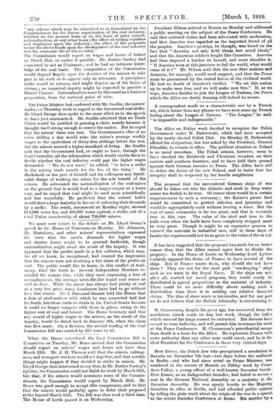We must now return to the debate on Mr. Lloyd
George's speech in the House of Commons on Monday. Mr. Adamson, Mr. Hartshorn, and other miners representatives expressed the view that the men's demands for higher wages and shorter hours slight to be granted forthwith, though nationalization might await the result of the inquiry. It was apparent that the profits made in a few collieries, which may, for all we know, be exceptional, had created the impression that the miners were not receiving a fair share of the profits on real. The public would like to know, in this conflict of testi- mony, what the truth is. Several independent Members re- minded the miners that, while they were expressing a fear of unemployment, the average town-dweller found coal scarce as well as dear. While the miner has always had plenty of coal at a very low price, many Londoners have had to go without fires this winter. Sir J. Harwood-Banner told the House that a firm of steel-makers with which he was connected had lost its South American trade to rivals in the United States because it could no longer compete with them in prices, owing to the higher cost of coal and labour. The Home Secretary said that any award of higher wages to the miners, as the result of the inquiry, would be dated back to January 9th, when the claim was first made. On a division, the second reading of the Coal Commission Bill was carried by 257 votes to 43.


































 Previous page
Previous page